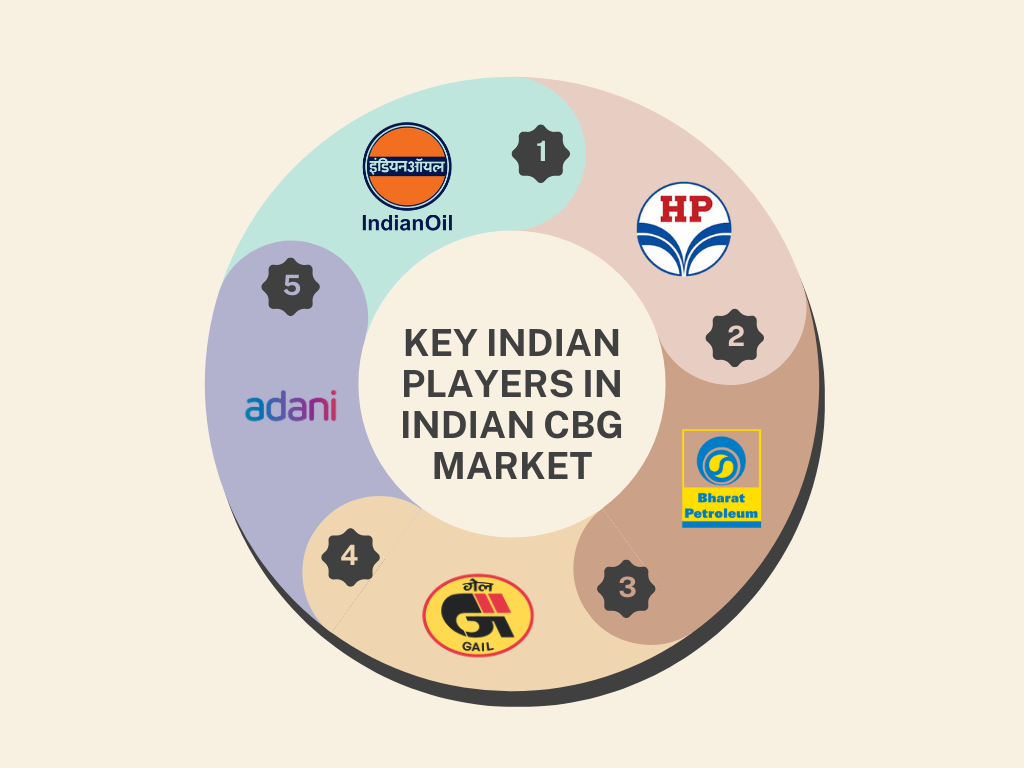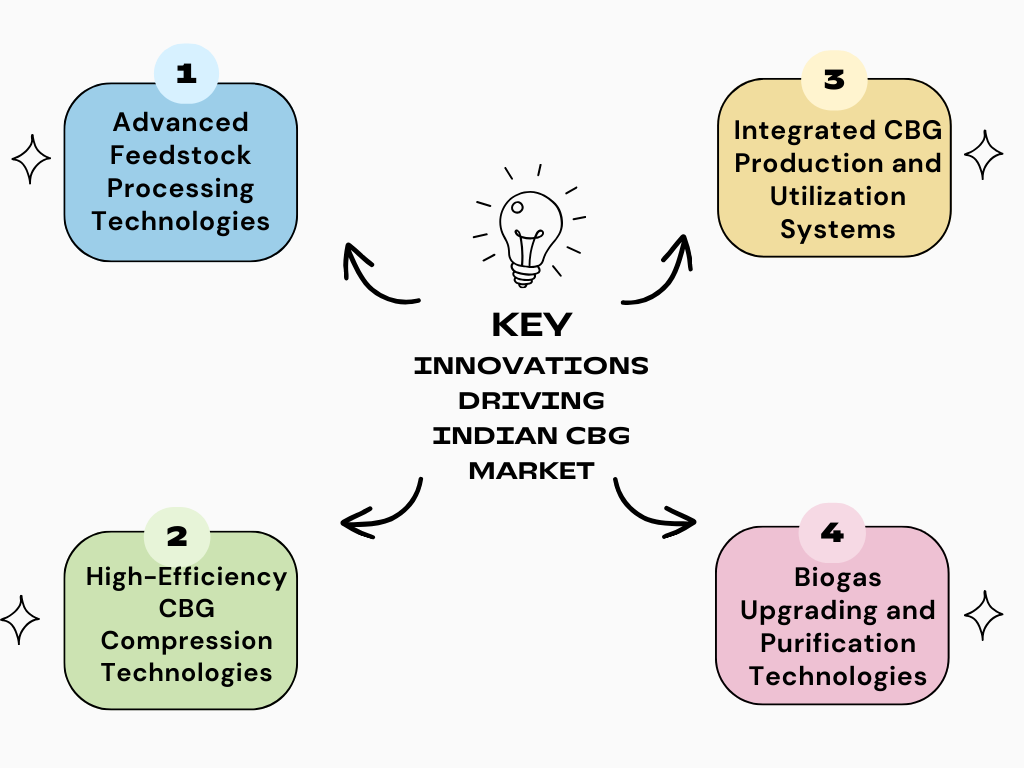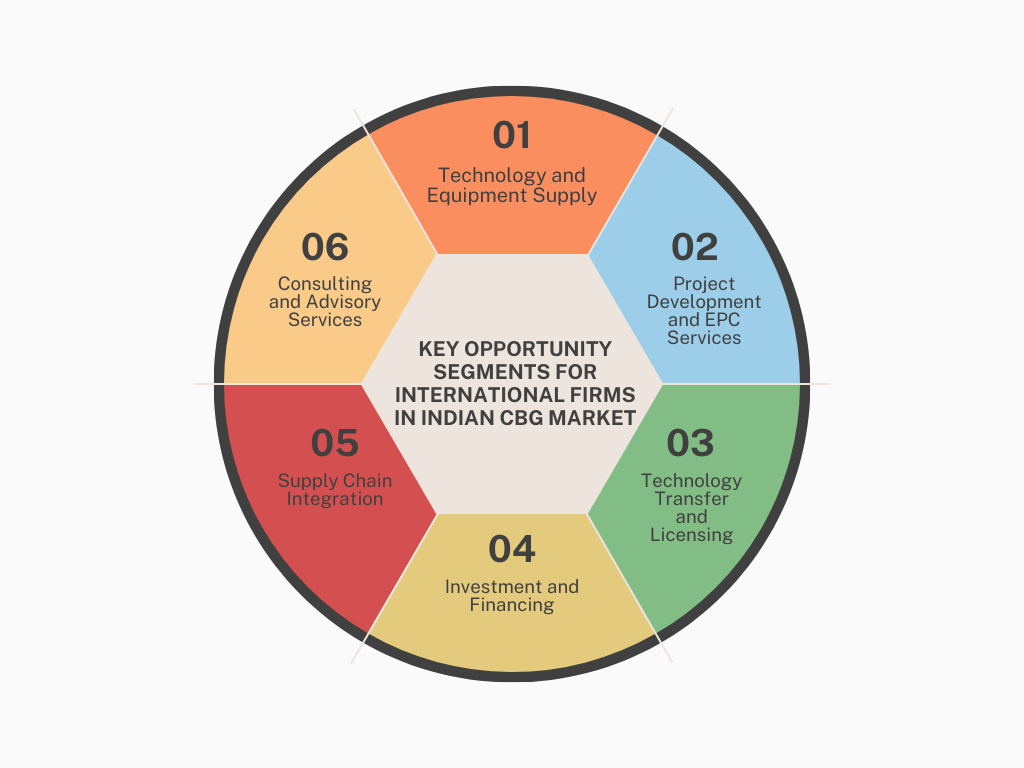What Factors Make the Indian Compressed Biogas Market Appealing for International Investment?
India’s Compressed Biogas (CBG) market has emerged as a hotspot for international investment, driven by a convergence of factors ranging from government policies to technological innovations. With a burgeoning demand for sustainable energy sources and a conducive regulatory environment, international investors are eyeing India’s CBG market as a lucrative destination.

The Indian Compressed Biogas (CBG) market presents several compelling reasons for international investment:
- Government Support and Policies: The Indian government has been actively promoting the use of CBG as a sustainable alternative fuel. Various policies and incentives such as financial support, subsidies, and favorable regulations have been implemented to encourage investment in the CBG sector.
- Rising Energy Demand: India’s growing population and expanding economy have led to a surge in energy demand. CBG, derived from organic waste, offers a renewable and environmentally friendly solution to meet this increasing energy demand while reducing reliance on traditional fossil fuels.
- Environmental Benefits: CBG production contributes to waste management and environmental sustainability by utilizing organic waste materials such as agricultural residues, municipal solid waste, and livestock manure. Investing in CBG projects aligns with global efforts to reduce greenhouse gas emissions and combat climate change.
- Market Potential: With a large population and increasing urbanization, India represents a significant market for CBG as a clean and affordable alternative fuel for transportation, industrial, and domestic use. The potential for growth in the CBG market is substantial, creating attractive opportunities for international investors.
- Technological Advancements: Technological advancements in biogas production and purification processes have improved the efficiency and viability of CBG production. International investors can leverage their expertise and resources to introduce innovative technologies and drive further development in the Indian CBG market.
- Partnership Opportunities: Collaboration between international investors and Indian companies or government agencies can facilitate knowledge transfer, capacity building, and technology exchange in the CBG sector. Joint ventures and partnerships offer mutual benefits by combining local insights and resources with international expertise and capital.
IMPERATIVES FOR CBG FOR INDIA
Compressed Biogas (CBG) holds significant potential for India’s energy sector, offering a sustainable and eco-friendly alternative to conventional fuels. To harness its benefits effectively, several imperatives need to be addressed:
Net Zero by Narsi
Insights and interactions on climate action by Narasimhan Santhanam, Director - EAI
View full playlist- Policy Support and Incentives: Government initiatives should provide favorable policies, subsidies, and incentives to encourage investment in CBG production and distribution infrastructure.
- Market Development: Establishing a robust market for CBG by promoting its use in various sectors such as transportation, industrial, and residential, through awareness campaigns and incentives.
- Technology Development and Innovation: Continuous research and development efforts are crucial to enhance CBG production efficiency, improve purification techniques, and develop cost-effective storage and distribution systems.
- Infrastructure Development: Investment in infrastructure for CBG production, purification, compression, storage, and distribution networks to ensure availability and accessibility across the country.
- Financial Support: Access to financing options and investment capital for CBG projects to facilitate their development and scale-up.
- Capacity Building: Training programs and capacity-building initiatives for stakeholders involved in CBG value chain, including farmers, entrepreneurs, and technicians, to ensure effective implementation and operation of CBG projects.
- Feedstock Availability: Ensuring a consistent and sustainable supply of organic feedstock such as agricultural residues, organic waste, and sewage for CBG production through incentives for waste-to-energy projects and agricultural practices that promote biomass availability.
- Quality Standards and Certification: Establishing quality standards and certification processes for CBG production, ensuring safety, reliability, and compliance with environmental regulations.
- Public-Private Partnerships: Encouraging collaboration between government bodies, private sector companies, research institutions, and NGOs to drive innovation, investment, and knowledge sharing in the CBG sector.
- Awareness and Education: Conducting awareness campaigns and educational programs to educate consumers, businesses, and policymakers about the benefits of CBG as a clean and renewable energy source, fostering its wider adoption.
KEY INDIAN PLAYERS IN THE INDIAN CBG MARKET

- Indian Oil Corporation Limited (IOCL): By the end of 2022-23, IOCL had commissioned 22 CBG plants, offering biogas through 46 Indigreen outlets. It said that a 200 tonnes per day (TPD) plant has been set up in Gorakhpur using agri-crop residue and providing an eco-friendly solution for rice straw disposal.
- GAIL (India) Limited: GAIL, the state-owned natural gas processing and distribution company, has also ventured into the CBG market. GAIL India Ltd and TruAlt Bioenergy have entered into a $72-million compressed biogas (CBG) joint venture to set up 10 plants with targeted production of over 33 million kg of CBG using organic waste as raw material.
- Bharat Petroleum Corporation Limited (BPCL): BPCL, another major player in India’s oil and gas sector, has been exploring opportunities in the CBG space. The board of directors of Bharat Petroleum Corporation Limited (BPCL) has given its nod for the proposed waste-to-bio-CBG (also known as compressed biogas) plant in Kochi. The proposed plant would prove beneficial to other local bodies around Kochi Corporation too.
- Adani Group: Adani TotalEnergies plans to set up five CBG units across India, and RIL 100 plants, in the next five years. Under the Sustainable alternative towards affordable transportation (Satat) scheme, the government is looking at adding 5,000 CBG plants and a production capacity of 15 million tonnes.
KEY INTERNATIONAL AND GLOBAL PLAYERS IN INDIAN CBG MARKET

- Clean Energy Fuels: Clean Energy Fuels, a U.S.-based company specializing in renewable natural gas (RNG) production and distribution, has shown interest in expanding its presence in international markets, including India. The company could potentially contribute to the development of CBG infrastructure and technology in India.
- EnviTec Biogas AG: EnviTec Biogas AG, a German biogas plant manufacturer and operator, has a global presence and offers technology solutions for biogas production, purification, and utilization. The company has the expertise to support CBG projects in India through technology transfer and collaboration with local partners.
- Hitachi Zosen Corporation: Hitachi Zosen Corporation, a Japanese engineering and environmental solutions company, has experience in biogas plant construction and operation. The company could potentially contribute to the development of CBG projects in India through technology transfer and partnership with local stakeholders.
- Ductor Corporation: Ductor Corporation, a Finnish biotechnology company, specializes in organic waste treatment and biogas production using advanced microbial technology. The company has the potential to offer innovative solutions for organic waste management and CBG production in India.
- Wärtsilä Corporation: Wärtsilä, a Finnish technology company specializing in energy solutions, has expertise in gas engines and power generation systems suitable for biogas applications. The company could play a role in providing power generation solutions for CBG projects in India.
GOVERNMENT POLICIES FOR CBG
| Initiative | Objective | Key Components |
|---|---|---|
| Pradhan Mantri Kisan Urja Suraksha evam Utthaan Mahabhiyan (PM KUSUM) | To promote the use of renewable energy sources in the agricultural sector | Financial support for setting up biogas plants and generating electricity from agricultural waste, including CBG production |
| Sustainable Alternative Towards Affordable Transportation (SATAT) Initiative | To promote the production and use of CBG as an alternative clean fuel for transportation | Incentives such as guaranteed purchase agreements and financial assistance for setting up CBG production plants |
| National Policy on Biofuels | To promote the use of renewable fuels, including CBG, to reduce dependency on fossil fuels and mitigate environmental pollution | Guidelines and incentives for the production, distribution, and utilization of biofuels, including CBG |
.KEY CHALLENGES FACED BY INDIAN CBG MARKET
- Feedstock Availability and Quality: The availability and quality of feedstock, such as agricultural residues, organic waste, and sewage, are crucial for CBG production. However, inconsistent and inadequate feedstock supply, as well as variations in feedstock quality, pose challenges for CBG plant operations and efficiency.
- Technology and Infrastructure Constraints: The lack of advanced technology and infrastructure for CBG production, purification, compression, storage, and distribution is a significant challenge. Existing technologies may not be optimized for Indian conditions, leading to lower efficiency and higher costs.
- Financing and Investment: CBG projects require significant upfront investment, and accessing financing options and investment capital can be challenging, especially for small and medium-sized enterprises (SMEs) and startups. Limited availability of financing options and high capital costs hinder the development of CBG projects.
- Policy and Regulatory Framework: Inadequate policy support, inconsistent regulatory frameworks, and lack of clear guidelines pose challenges for CBG market development. Uncertainties related to incentives, subsidies, and regulatory compliance create barriers for investors and developers.
- Market Development and Demand: Developing a robust market for CBG as a viable alternative fuel requires efforts to increase awareness, promote adoption, and create demand among consumers, businesses, and policymakers. Limited consumer awareness, lack of infrastructure for CBG utilization, and competition from conventional fuels are challenges in market development.
- Supply Chain and Distribution Challenges: Establishing an efficient supply chain and distribution network for CBG, including transportation, storage, and retail outlets, is essential for market penetration. However, challenges such as inadequate infrastructure, logistical constraints, and lack of dedicated CBG distribution channels hinder the efficient distribution of CBG.
- Technological Innovation and Research: Continuous research and development efforts are required to improve CBG production technologies, enhance purification techniques, develop cost-effective storage solutions, and optimize distribution systems. Limited R&D investment and innovation in CBG technologies pose challenges for improving efficiency and reducing costs.
- Environmental and Social Considerations: Ensuring environmental sustainability and addressing social concerns related to CBG production, such as land use, water consumption, and waste management, are critical challenges. Balancing environmental benefits with potential social and environmental impacts is essential for the long-term viability of CBG projects.
KEY INNOVATIONS DRIVING THE INDIAN CBG MARKET

- Advanced Feedstock Processing Technologies: Innovations in feedstock processing technologies enable efficient conversion of diverse organic feedstocks such as agricultural residues, organic waste, and sewage into biogas. Advanced pre-treatment and digestion technologies improve feedstock conversion efficiency and biogas yield, enhancing CBG production.
- Biogas Upgrading and Purification Technologies: Innovations in biogas upgrading and purification technologies enable the removal of impurities such as carbon dioxide, hydrogen sulfide, and moisture from biogas, resulting in high-purity methane suitable for compression and use as CBG. Advanced membrane-based and pressure swing adsorption (PSA) technologies improve biogas purification efficiency and reduce operating costs.
- High-Efficiency CBG Compression Technologies: Innovations in CBG compression technologies improve compression efficiency, reduce energy consumption, and enhance the performance of CBG compression units. Advanced compressor designs, including rotary screw compressors and reciprocating compressors, optimize compression processes and enable higher CBG production rates.
- Integrated CBG Production and Utilization Systems: Innovations in integrated CBG production and utilization systems enable efficient utilization of CBG for power generation, heating, and transportation applications. Combined heat and power (CHP) systems, biogas engines, and CBG-powered vehicles equipped with advanced engine technologies maximize the energy efficiency and utilization of CBG.
KEY OPPORTUNITY SEGMENTS FOR INTERNATIONAL FIRMS IN INDIAN CBG MARKET

- Technology and Equipment Supply: International firms specializing in biogas production, purification, compression, and utilization technologies have opportunities to supply advanced equipment, components, and systems to Indian CBG projects. This includes biogas plants, purification units, compression units, biogas engines, and related infrastructure.
- Project Development and EPC Services: International firms with experience in engineering, procurement, and construction (EPC) services for renewable energy projects can provide project development, design, and construction services to Indian CBG projects. This includes turnkey solutions for CBG plant construction, installation, and commissioning.
- Technology Transfer and Licensing: International firms with proprietary CBG production and purification technologies can explore opportunities for technology transfer, licensing, and collaboration with Indian partners. This allows Indian companies to access advanced technologies and expertise, accelerating the development and deployment of CBG projects.
- Investment and Financing: International financial institutions, investors, and venture capital firms can provide investment and financing solutions for Indian CBG projects. This includes equity investment, project financing, debt financing, and venture capital funding to support the development and scale-up of CBG projects in India.
Consulting and Advisory Services: International consulting firms specializing in renewable energy, sustainability, and environmental consulting can provide consulting and advisory services to Indian CBG projects. This includes feasibility studies, market assessments, regulatory compliance, and strategic planning support for CBG project development.





 Our specialty focus areas include
Our specialty focus areas include



